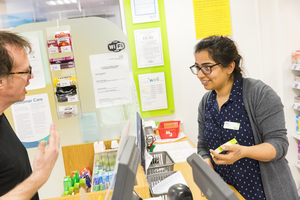National roll-out of electronic prescription service
The service will help GPs and pharmacists prescribe and dispense medicines faster and more securely and make it easier for patients to pick up repeat prescriptions.

All prescriptions across England will be digitised to make staff and patients’ lives easier, Primary Care Minister Jo Churchill has announced today.
The electronic prescription service (EPS) will be rolled out nationally next month, following rigorous testing involving 60 GP practices and hundreds of pharmacies.
Almost 70% of all prescriptions are already being prescribed and dispensed through EPS and there has been positive feedback from GPs and pharmacies. Once the roll-out of the final stage is completed, nearly all prescriptions will be sent electronically.
A unique prescription barcode will be given to patients, which can be scanned at any pharmacy to retrieve medication details. This information is held on the secure NHS database and will allow a patient’s prescription to be accessed quickly by GPs and pharmacies.
The EPS will save the NHS £300 million by 2021 by increasing efficiencies, reducing the amount of paper processing required and reducing prescribing errors.
It will increase efficiencies across the NHS by:
- eliminating the need for patients to pick up repeat prescriptions from their GP
- allowing prescribers to digitally sign and cancel electronic prescriptions, rather than using a physical signature
- reducing the amount of administration needed around prescriptions, and reduce the volume of prescriptions that need to be stored
Primary Care Minister Jo Churchill said:
Digitising the entire prescription service is a key part of keeping up the drive to make the NHS fit for the 21st century. This will free up vital time for GPs and allow pharmacists to spend more time with their patients, and save millions of pounds a year.
It’s another important step towards eventually making all prescriptions paperless. We are continuing to improve technology across the NHS, which will ultimately improve care for patients.
Dr Ian Lowry, Director of Digital Medicines and Pharmacy at NHS Digital, said:
Every prescription that is sent electronically saves money for the NHS by increasing efficiency. The system is also safer and more secure, as prescriptions can’t be lost and clinicians can check their status online.
This is a huge milestone to reach, and one which benefits patients, GPs, pharmacists and the NHS as a whole.